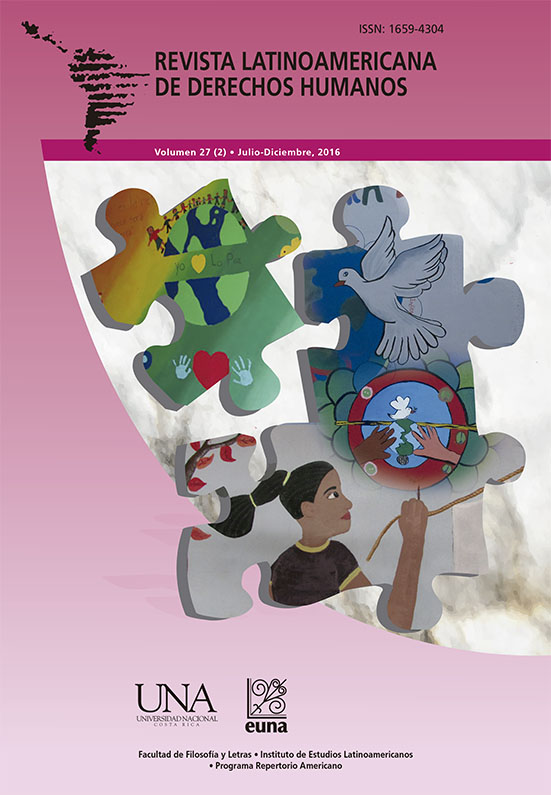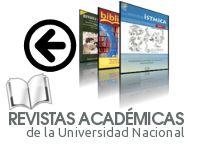Human Rights Education in Argentina: Notes on the process of incorporating human rights in educational contexts
DOI:
https://doi.org/10.15359/rldh.27-2.10Keywords:
Education, Human Rights, Citizenshi, PoliticsAbstract
This work provides a brief description of the various political and economic contexts that enabled the incorporation of human rights in different Argentine institutions, starting with informal education and eventually coming to form part of the curricula at all educational levels. Its purpose is to visualize how human rights education developed and which spheres of the Argentine culture drove and demanded the need for human rights and human rights education. Since one of the purposes of education is to train citizens, this article intends to show that the practice of human rights is a way of exercising citizenship and that the educational sphere is the proper context for human rights to gain respect in diverse cultural practices.
References
Auyero, J and Berti, M. (1993). La violencia en los márgenes. Una maestra y un sociólogo en el conurbano bonaerense. Madrid: Katz.
Barcena, F. (2014). La educación como acontecimiento ético. Natalidad, narración y hospitalidad. San Martin: Miño y Davila.
Braslavsky, C. C. (1995). Educación para la ciudadanía y los derechos humanos, diez años después. En L.-N. En Tiramonti, G. (Ed.) Las transformaciones de la educación a diez años de democracia. (pg. NDA). Buenos Aires: Tesis-Norma.
Espacio Memoria y Derechos Humanos. (Undated). Retrieved from
Fernandez, M. (2013). La educación en derechos humanos en la Argentina. Bernal: Editorial de la Universidad Nacional de Quilmes.
Fernandez, M., Gongora, R., Manchini, N. and Ripa Alsina, L. (2008-2013). CReCER. Creando Redes Ciudadanas, Educativas y Responsables. Buenos Aires, Argentina: Bernal.
Finocchio, S. (1999). Temas de la agenda curricular de ciencias sociales para el 2000. Una propuesta de desarrollo curricular para la Argentina del próximo siglo. Ponencia presentada al Congreso de Logroño (pg. NDA). Logroño: NDA.
Garcia, D. (1996). Estado y sociedad en una época de cambios. Serie de Documentos 201. Buenos Aires: Flacso.
InfoLEG. (2015, August 27). Información Legislativa del Centro de Documentación e Información. Argentina. Retrieved from
http://www.infoleg.gov.ar/infolegInternet/anexos/150000-54999/152155/norma.htm
Ministry of Education. (2015, 25 August). educar. Retrieved from
http://portal.educ.ar/noticias/educacion-y- sociedad/se-viene- el-foro- mundial-de-ed.php
Office of the President of the Argentine Nation. (2015, July 31). Press Room. Retrieved from http://prensa.argentina.ar/2013/10/04/44717-promulgan- la-ley- de-convivencia-en- las-escuelas.php
Pagina12. (2015, July 31). Pagina12.com.ar. Retrieved from
http://www.pagina12.com.ar/diario/sociedad/3-228909- 2013-09- 13.html
Rabossi, E. (1988). La enseñanza de los Derechos Humanos en la República Argentina. Buenos Aires: Undersecretariat of Human Rights. Ministry of the Interior. Argentine Republic.
Ranciere, J. (2012). El descuerdo. Política y filosofía. Buenos Aires: Nueva Visión. Latin American Human Rights Education Network. (2015, July 25). REDLATEDH. Retrieved from http://redlatinadeedh.com.ar/
Secretariat of Human Rights of Buenos Aires Province. (2015, August 25). BA Secretary of Human Rights. Retrieved from http://www.sdh.gba.gov.ar/areas/avm.php
Website of the Ministry of Justice and Human Rights (2015, August 25). Ministry of Justice and Human Rights. Office of the President of the Argentine Nation. Retrieved from http://www.jus.gob.ar/areas-tematicas/violencia- de-genero.aspx
Website of the Ministry of Justice and Human Rights. (2015, June 22). Secretariat of Human Rights. Retrieved from http://www.jus.gob.ar/derechoshumanos/comunicacion-y-prensa/noticias/2015/06/22/la-secretaria- de-derechos- humanos-se- reunio-con-periodistas-con- vision-de- genero.aspx Website of the Museum Malvinas and South Atlantic Islands: Peace, Memory and Sovereignty. (Undated). Retrieved from http://www.museomalvinas.gob.ar/
Downloads
Published
How to Cite
Issue
Section
License
El material que se publica en esta Revista está bajo una licencia “Creative Commons” 3.0 Costa Rica (CC, Reconocimiento-NoComercial-SinObraDerivada 3.0 Costa Rica (CC BY-NC-ND 3.0 CR) . Esto significa que el material publicado en la revista se puede compartir (copiar y distribuir) en cualquier medio o formato considerando que se debe reconocer de forma adecuada la autoría del material y la fuente, no puede utilizarse con fines comerciales y no se aceptan las obras derivadas (remezclar, transformar o crear a partir del material).








